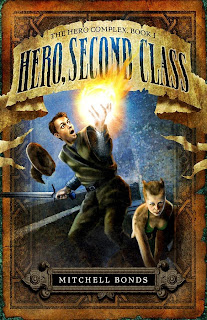 This is the one that I was most intrigued by. Jeff Gerke, publisher of Marcher Lord, has been raving about this book for a while, especially since Bonds was only 18 when he submitted this book to Marcher Lord Press. And seeing as I'm a cautious fan of Peter David's books, I was looking forward to a goofy send-up of fantasy tropes.
This is the one that I was most intrigued by. Jeff Gerke, publisher of Marcher Lord, has been raving about this book for a while, especially since Bonds was only 18 when he submitted this book to Marcher Lord Press. And seeing as I'm a cautious fan of Peter David's books, I was looking forward to a goofy send-up of fantasy tropes.
Bond's book did not disappoint. Right from the first three sentences, I knew that I was in for a goofy story. We have a hero that narrates his fight scenes, guilds that govern the interaction of the Heroes and the Villains, wise-cracking cat people, invisible centaurs, and a plethora of elvish races with their own unique names.
Bonds accomplished what he set out to do in telling this story. It is a great parody of fantasy stories with plenty of laugh-out-loud moments. A few jokes fell kind of flat for me, especially the times when Bonds "broke the fourth wall," so to speak. But by and large, I was satisfied with the silliness of the jokes and the way he skewered fantasy conventions.
But I did have a bit of a problem with the theological content of the story. I hesitate to bring that up, but in the interest of fairness, I feel I have to. Simply put, there were times when I thought I was reading a standard fantasy book that just happened to have some Christian thought glopped onto it.
The reason I say that is because of the strange pantheon of gods that's hinted at. In the opening paragraph of the book, Bonds makes a reference to Vertis the Sky god. Other gods are named throughout the story. And in the mix is the Creator, the obvious Christian analogue. I guess my question is, how does the Christian God fit into this pantheon of twelve lesser gods? Are the lesser gods not real? It's not discussed in the book. While this might be addressed in future books (for this is the first book in the Hero Complex series), it left me a little uneasy.
The same is true about the fairly standard use of magic throughout the book. How does that fit into a Christian worldview? Again, this will probably be addressed in future books as well, but it again left me a little worried.
Maybe I'm making a mountain out of a molehill. As a matter of fact, I probably am. This is still a solid debut novel full of wit and energy and well worth the investment to read.




No comments:
Post a Comment